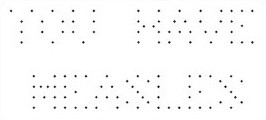2.3 Grice on natural and non-natural meaning
Ironically, the word ‘meaning’ has many different meanings. There are four occurrences of ‘mean’ (or ‘meaning’ or ‘meant’, etc.), italicised, in the following paragraph:
Roberto's instructor had been mean to put it so bluntly, but she was probably correct that his short legs meant he would never be a great dancer. He turned into the narrow alleyway, meaning to take a shortcut home. His life no longer seemed to have any meaning.
Here is the paragraph again, with each of the four occurrences of ‘mean’, ‘meant’ and ‘meaning’ replaced with an appropriate synonym.
Roberto's instructor had been cruel to put it so bluntly, but she was probably correct that his short legs were bound to result in his never being a great dancer. He turned into the narrow alleyway, intending to take a shortcut home. His life no longer seemed to have any purpose.
There is no good reason to demand of a theory of meaning that it give an account of every kind of meaning. It may turn out that there is some underlying unity to the uses of ‘mean’ (or ‘means’, ‘meant’, ‘meaning’) on display here, but that is not something on which we should insist.
In view of the plethora of meanings of 'meaning’, Grice proposes to set aside those that are not his immediate concern and to focus on understanding the nature of those that are. One kind of meaning that is left over is defined by Grice in terms of the speaker's intentions. This is a good candidate for being the kind of meaning we are interested in, i.e. the meaning utterances have that accounts for the role they play in communication. But before coming to what he says about this kind of meaning, we need to see which kinds of meaning he sets to one side as confusing distractions.
Grice begins his paper (Reading 1) by making an important distinction between two species of meaning that it is particularly easy to confuse, which he labels natural meaning and non-natural meaning. The kind of meaning he later defines in terms of speakers’ intentions is non-natural meaning. Natural meaning is the kind being attributed in claim (a):
(a) ‘Those spots on your face mean you have measles.
This claim could be true only if the italicised sub-sentence is true, i.e. only if you really do have measles. If you had spots but you didn't have measles, the spots would not mean that you had measles. They would have to have some other source. Contrast this with claim (b), which uses ‘mean’ in its non-natural sense:
(b) ’The spots in the arrangement below mean you have measles.’

This whole assertion would be true even if the italicised sub-sentence was false. That is, an assertion of (b) would still be correct even if you did not have measles. Generalising, the difference between the two kinds of meaning is this: it is consistent with something's having non-natural meaning that what it non-naturally means is false; but it is not consistent with something's having natural meaning that what it naturally means is false. (In the paper, Grice notes other differences, but this is the main one.)
Grice's purpose in making this distinction is merely to avoid confusion. He sets natural meaning (or ‘meaningn’ as he calls it) to one side and moves on to developing a theory of non-natural meaning (‘meaningnn’), the kind he is more interested in. His partiality has to do with the fact that examples of meaning that involve language are typically cases of meaningnn, and no one has so far come up with a good theory of meaningnn. Natural meaning, by contrast, does not really have much to do with the meaning of words or utterances, and is in any case relatively non-mysterious. ‘X meansn that p’ can be understood as a substitute for one or other of various simple phrases, including:
X causes it to be the case that p
X is conclusive evidence for p
X is not possible unless p is true
X entails that p
Natural meaning is mentioned later in his paper, but only in order to clear up potential confusions, not because Grice is especially interested in it.
Activity 2
Read Part I of Grice's paper, ‘Meaning’. The original paper is not actually divided into parts; they are my addition (indicated by the square brackets) to facilitate guided reading. Grice distinguishes natural from non-natural meaning. He also rejects an attempt (by C.L. Stevenson) to define non-natural meaning in terms of natural meaning, prior to offering his own theory of non-natural meaning in the rest of the paper.
Click to view Part I ‘Meaning’ by H.P. Grice: ‘Natural meaning distinguished from non-natural meaning’ [Tip: hold Ctrl and click a link to open it in a new tab. (Hide tip)]
Which of the following claims about meaning are most plausibly interpreted as claims about natural meaning, and which are most plausibly interpreted as claims about non-natural meaning?
(i) John is sneezing. This means he has a sinus infection.
(ii) The French sentence, ‘Pierre aime les chats’, means that Pierre likes cats.
(iii) In saying what he did, John meant that he would be late.
(iv) Failure to bring an accurate map with him meant that John would be late.
Discussion
(i) Natural. If John has no sinus infection, his sneezing could not possibly mean that he had a sinus infection. If it means anything, it would have to mean something else, e.g. that there is pepper in the air.
(ii) Non-natural. The sentence would mean what it does even if Pierre hates cats.
(iii) Non-natural. John's utterance (whatever it was – perhaps it was ‘I will be late’ or ‘start without me’) would have had this meaning even if he in fact ends up arriving on time.
(iv) Natural. Suppose John arrived on time. This would lead us to reject the claim that his failure to bring an accurate map meant that he would be late.
The distinction between natural and non-natural meaning is, Grice notes, not always clear cut. The same entity can sometimes have both natural and non-natural meaning. Here is an illustration:
The canyon-dweller's shout of ‘here comes an echo’ meant that we would hear an echo a few seconds later.
This is plausible on both readings of ‘meant’. But in most cases the distinction seems to be reasonably easy to apply. Let us move on, then, to Grice's theory of non-natural meaning. (Henceforth in this section, ‘meaning’ should be read as ‘non-natural meaning’ unless specified otherwise.)
